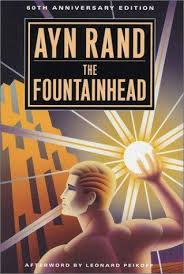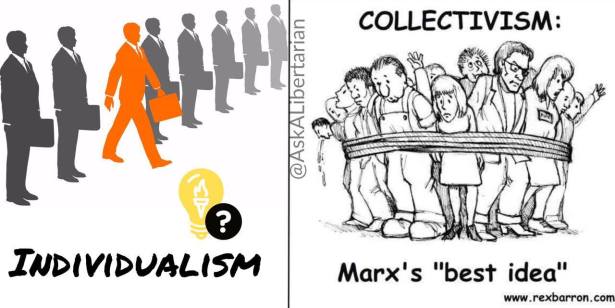The Fountainhead
Author: Ayn Rand
Genre: Philosophy, Fiction, Classics

One of the most brilliant books ever written! A treatise on individualism and the ideal man, it also showcases the hypocrisy of the society we all live in.

Howard Roark as an architect is the famous protagonist and the author’s depiction of an ideal man. He tries to create original designs as an ode to humanity but is condemned by his peers, leaders and society for not conforming to status quo. Ayn beautifully portrays the struggle of an original thinker who does not pursue money or name, nor even a desire to help others. Just the pursuit of creative thought unbridled by any external authority.
“Men have been taught that the highest virtue is not to achieve but to give. Yet one cannot give that which has not been created. Creation comes before distribution – or there will be nothing to distribute.”

For his outlandish designs, Howard is rejected professionally and is even sued for incompetence (he creates an unusual design with a nude image for a temple) and finally loses the case. The irony is that many who testify against him have been secretly using his designs in their own works.
Howard remains unfazed. True Freedom is defined as, “To ask nothing. To expect nothing. To depend on nothing.”

Dominique is his beautiful, sensual love interest, also supremely independent. She tries to protect Howard but fails and, in her frustration, marries Howard’s worst enemy and his classmate, Keating. She worships the human greatness of Howard Roark but also pragmatically realizes that such men are doomed to fail in a society ruled by mediocres. Keating gets one commercial success after another but later starts asking questions on who has achieved real success – Roark who followed his own path or Keating who depended on society’s approval.
In a romantic defense of egoism, the novel says, “To say ‘I love you’, one must first know how to say the ‘I’”.
Gail Wynand is the rich owner of a newspaper, independent himself (dates multiple women and let’s media talks of his many affairs but as a rule does not sleep with any of them) and prides himself on his power and ability to shape opinion. He genuinely believes in Howard and tries to defend him but realizes his power remains because he continued to pander to public taste. When he chooses to go against popular mood, all his supporters go away and his newspaper comes to the verge of collapse. He bails out realising the true nature of the power he held: those he thought he controlled, actually controlled him.
He finally shuts down his newspaper and gives Roark a final task: To build New York’s tallest skyscraper and to “Build it as a monument to that spirit which is yours… and could have been mine.”

Toohey is the scheming opinion maker who masquerades as a humanitarian. His speech on how people like him obtain power is a macabre reminder of much that is happening around us today: “If you learn how to rule one single man’s soul, you can get the rest of mankind. It’s the soul. Not whips or swords or fire or guns…. Want to know how it’s done?… Make man feel small. Make him feel guilty… Preach selflessness. Tell man that he must live for others. Tell men that altruism is the idea… Not a single man has ever achieved it… Man realizes that he’s incapable of what he’s accepted as the noblest virtue – and it gives him a sense of guilt, of sin, of his own basic unworthiness… You’ve got him. He’ll obey. He’ll be glad to obey – because he can’t trust himself, he feels uncertain, he feels unclean.”
Intelligent himself, Toohey realizes that Keating is no match for Howard, yet does everything to promote Keating and destroy Howard. Because if everyone became a Roark, there will be no place for opinion leaders like Toohey. People like Toohey feed on our insecurities and need for public approval while Howard cared a damn about what others thought of him.
Toohey: “Mr. Roark, we are alone here. Why don’t you tell me what you think of me?”
Roark: “But… I don’t think of you”
Therefore, Toohey’s philosophy is that “Great men can’t be ruled. We don’t want any great men.”
Ayn Rand was a Russian but quickly developed a distaste for socialism, communism and all forms of collectivism where the individual will is subjugated to (supposedly) common good. The problem in this model is that everyone who preaches that we should be slaves to common good sees their own selves as masters who will guide us in the right direction!
Believing that “the world is perishing from an orgy of self-sacrificing”, the author’s message is that independence, integrity and rational individualism are much higher values than conformity. Ego is the fountainhead (and hence the title of the book) of human achievement and progress. In her own words: “My philosophy (Objectivism), in essence, is the concept of man as a heroic being, with his own happiness as the moral purpose of his life, with productive achievement as his noblest activity, and reason as his only absolute.”

I spent days agonizing over this message celebrating ego (I mean, how will society, as a collective, exist if everyone chooses to pursue selfish self-interest?) but still came out a strong believer in Ayn Rand. The many speeches in the book (read Toohey’s explanation of how in making God big, we have made humans small; and Roark’s defense of creative selfishness) will make us stop and think. In a paradoxical way, the invisible hand of capitalism (even with all its flaws) still ensures the greater good. The fine line is between the right selfishness (pursuing my ambition without a concern to other’s opinion) and the wrong altruism (sacrificing my own individuality to pander to public sentiment).
The book, really thick (700 pages) with small fonts, is not an easy read. Many criticized it for being too intellectual (12 editors rejected it before it eventually became a best-seller). The other feminist criticism is on the first sexual encounter between Howard and Dominique (“rape by engraved invitation”) which is seen as being offensive to women. A grammatical error in the book is the use of the word ‘egotist’ in describing Roark while Ayn meant (and later clarified) ‘egoist’. Finally, I personally think that the author missed an important distinction: altruism and individuality can co-exist in different arenas of life and may not always lead to a zero sum game.

Why should you read the book: A supremely engaging story, deep philosophy in a tightly wrapped fictional plot, that will make us think and question many of society’s ‘universal truths’. The story of one man against the system may provide us courage to establish our own philosophy of life, instead of following the rat race. The book and philosophy have influenced youth the world over and made Ayn Rand a cult hero. The cult was the cult of “man-worshipers… those who saw man’s highest potential and strived to actualize it.” [Funnily, it even became fashionable to be an Ayn Rand fan… Eva Mendes, for instance, said that anyone who wanted to be her boyfriend should first be an Ayn Rand fan!]
Goodreads Link: The Fountainhead by Ayn Rand | Goodreads

 This information will never be shared with third party
This information will never be shared with third party
Fountainhead is not a book, it is a philosophy of living….man as man should be. Mere reading of this book can bring a paradigm shift in your thinking process. Great, comprehensive, well rounded review…but reading a review is not enough, you must read this book!
Gives a good feel of the book! Very Well written.
I had read this book almost 10 years ago. Reading the review made everything so fresh in my mind. Fountainhead is a very appealing book which makes one question a lot of social rules. I completely agree when it is said that individuality and altruism is not necessarily a zero sum game but needs to be completely balanced
However some narrations in the book are beautifully written and makes one pause and think!
I read this book a while back, rules in this society were beautifully questioned. Very well wriiten book.
Great review, it is so true when someone goes against the popular opinion, support starts to fade